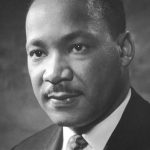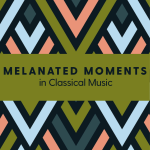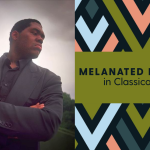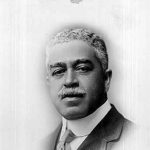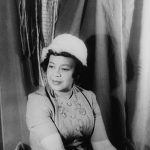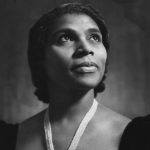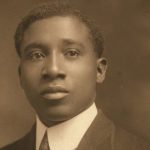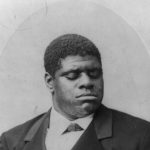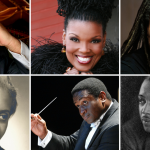MMCM S4E1: Francis Johnson: A Commission in Cotillion Culture
The first episode of Season 4 introduces audiences to the life, work, and continued impact of composer, bandleader, and culture creator Francis Johnson. Angela and Joshua listen to Johnson’s March and New Bird Waltz while providing commentary on Johnson’s unmistakable role in defining the sound of patriotic music for a young America desperate to cultivate an identity of its own.
Featured Music:
“Johnson’s March,” by Francis Johnson
“New Bird Waltz,” by Francis Johnson
Angela Brown (00:00): Before we get started with this episode, we wanted to thank our listeners for your amazing support of this podcast. We can’t wait to bring you future episodes, but we need your support. Just go to givebutter.com/melanatedmoments to help share more stories of exceptional Black artists with thousands of listeners across the US and around the world. Joshua Thompson (00:27): And if you’d like more information on each episode, go to our website or follow us on social media. Angela Brown (00:33): Follow my foundation on Facebook @morningbrown or on the web at morningbrown.org Joshua Thompson (00:41): And follow me, Joshua Thompson, on Instagram @sockjoplin. Music Plays (00:44): [MMCM Theme] Angela Brown (01:01): Hello everyone, and welcome back to another episode of Melanated Moments in Classical Music. I’m Angela Brown. Joshua Thompson (01:08): And I’m Joshua Thompson back once again to take our global audience on another trip to musical nerd land. Angela Brown (01:15): Well, I’m ready to take the trip with you, boo. But before we go, can we take a moment to acknowledge that this is season four of this podcast! I don’t know about you, honey, Joshua, but I need a little praise break up in here! Joshua Thompson (01:34): Yes, we had to give you a little bit of something cuz you know, Angela, we really have had so much fun and we’ve been so fortunate to have such wonderful partners in Classical Music Indy, National Endowment for the Arts, the Arts Council of Indianapolis, and the Indiana Arts Commission. And most of all, our growing audience that shares in our enthusiasm for diasporic composers of African descent. Angela Brown (02:14): I couldn’t agree more with you and we say, thank you. Now, Mr. Joshua, where are we going? And who are we going to visit in musical nerd land today? Joshua Thompson (02:26): Ooh, auntie I’m glad you asked. So, get ready. We’re going to travel the globe from Martinique to Philadelphia, to the courts of the British monarchy, across Western Europe, back to the American south all in the time between the American revolutionary war, the war of 1812, and just before the American civil war, Angela Brown (02:48): Child, I’m tired already. But Joshua, this trip sounds like it’s doing the most and you still ain’t told us who all over there. Joshua Thompson (02:57): You know you’re right. But auntie you know how I like to set up stuff and things for the people? Angela Brown (03:02): Yeah I do. So who over there, Joshua? Joshua Thompson (03:05): Okay. We doing all this to meet a man who honestly, I like to think of him as the Duke Ellington of the 19th century, Francis Johnson. Angela Brown (03:16): Now, you got me intrigued because I know how your blerd brain operates putting the historical, social, and musical puzzles together. Give us the tea on Francis Johnson. Joshua Thompson (03:29): Okay. Here comes a steaming cup of Francis Johnson for you. Born in 1792 in Philadelphia, although there’s competing research that deposits that he was born on the island of Martinique in the West Indies and then later immigrated to Philadelphia. But at any rate, he was a prolific pianist, violinist, bugler, band leader, and composer who wrote more than 200 compositions in various styles from operatic eras and Arias to minstrel songs and patriotic marches, ballads and other dances. And there’s only a few of his piano manuscripts that survive today. But despite all of that, uh, this is right around 1818, he’s one of the first diasporic composers to have his works published in actual print sheet music. So, at this time, yeah, at this time you’re seeing a lot of works by Beethoven and Brahms and Cherney and Weber. This brother is right there with them as one of the only people of African descent who’s got music in print. So I thought that was kind of cool. Angela Brown (04:36): That is cool. I love this podcast ’cause I always learn something new. Blerd on, brother, blerd on. Joshua Thompson (04:42): So here we go on the blerd [inaudible]. The reason why I made this allusion to him being like this, uh, you know, this early harbinger of a Duke Ellington because he is this, this band leader where his whole band is comprised at first exclusively of African American musicians. And that’s how he and this band initially gained popularity performing, at first, exclusively for Black audiences. Um, and then later goes on to participate in a lot of other more racially integrated concerts across the United States. So groundbreaking and pioneering. He gains a broader audience right around 1824 when he’s commissioned to compose and perform pieces that are supposed to be honoring the heroes of the revolutionary war specifically General Lafayette, um, which makes him one of the most commissioned and unsung composers, and also responsible for creating and developing what we know now as patriotic music. Angela Brown (05:42): Wow. Joshua Thompson (05:43): I know, right. I think the irony of this is just ridiculous because a Black man creates American patriotic music. Right? Very interesting. We’ll get to that later. Um, but he becomes so famous for this ’cause he’s so good at it. And the country is really in need of it. We’re still a young country in the early 1800s. We don’t really have an identity yet. And so he’s helping to create American identity. He has this amazing career and then he travels to Europe quite a bit. He performs for Queen Victoria. And while he’s in Europe, he really helps to bring back to America, this promenade style of music in which we could kind of call ballroom or cotillion like high society music. He’s the one who’s actually bringing all of this back to the United States and it will evolve from there into other genres. But that’s how we found his success here in America, but also abroad and because of that his compositional style and his works wildly influenced the future impressionistic composers like Claude Debussy and my personal favorite, Maurice Ravel and other, uh, composers who would go on to be the founding fathers of ragtime and jazz. So the brother was bad. He did it all. Angela Brown (06:54): This is incredible. So, so much to, unpack here. And I still, I’m still wrapping my head around your statement. That Johnson was one of the masterminds of patriotic music. Joshua Thompson (07:07): Yeah. Angela Brown (07:07): But not so much because you know, the spiritual is the motherboard of all American music of jazz, of rhythm and blues, of gospel, of musical theater. So it just kind of makes sense that patriotic music would come out of that or what we call patriotic music. I have a few questions though, but now give us an example of a patriotic and stately compositional hallmark of Francis Johnson. Joshua Thompson (07:40): Absolutely will. I love the points that you brought up earlier and I’ll, I’ll kind of caveat that maybe not patriotic music, let’s think nationalistic music, right? Like national anthems and stuff. So it’s that, but you’re right. Rooted in the spirituals. So we’re gonna listen to a piece that’s titled after himself, it’s called Johnson’s March. And I think this gives a really good vivid illustration of his understanding of how to compose pomp and circumstance while establishing himself as like arguably the most prolific band leader of the time. So let’s listen to Johnson’s March. Music Plays (08:12): [“Johnson’s March,” Francis Johnson] Angela Brown (11:22): Mm, yes. This, it sounds so Regal, stately and proud. Uh, but it also reminds me that at that time we were the help. So of course we would be playing for all of the dignitaries and uh, with the fancy dresses and tuxedos and top hats and all of that because we were the help. So yeah, Joshua Thompson (11:46): You’re exactly right. And, and he’s got this understanding because lives in America travels to Europe. So he understands this whole dynamic he’s he’s commissioned for high society folk, right? Clear European influence. And, and, and the reason why he’s so prized and coveted for his, you know, creative genius is because the dude knows his audience. He knows exactly who he is composing for. And this is how he’s able to craft what I call cotillion culture. So yes. Angela Brown (12:17): Yeah. And you know, America is a young country and we were jacking everybody’s style. Okay. So we wanted to, we wanted to be pulled up. So, uh, yes, of course they wanted to be fancy too. So they, they took it from the dude. So Joshua… Joshua Thompson (12:37): [Laughs] Yes ma’am. Angela Brown (12:37): How did his work gain popularity here in the United States? Because the time in which he’s living, ain’t ideal for Black people. Joshua Thompson (12:47): You know, it’s a great question and you’re right. No, it’s not, uh, there’s accounts and records where Johnson and his band, although that they were fairly popular, not always. And so a lot of times they were met with racial hostility, either in route to, uh, scheduled performances or once they actually got there and they figured out it’s a, a band of all Black people, some folks weren’t really having it. Right. Um, but he’s so good at what he does. And his music is so on the nose and, and typical of the time period and pushing it just a little bit, he works through all of that. But, uh, like you said earlier, America being such a young country, this is what helps them kind of bridge that racial gap. The United States is looking for an identity in culture, ’cause it doesn’t have its culture at all. And so they gonna borrow, beg, and steal from whoever is cranking out the hits and he happens to be the guy who’s doing that. Angela Brown (13:42): Exactly. I mean, this man was so good at what he did, his abilities transcended the racial barriers of the time. Imagine that: a Black man being responsible for patriotic music and high society stylings. Ha! The irony, the irony is not lost on me at all, Joshua. Joshua Thompson (14:03): It ain’t lost on me either. I, I do have another tune for you Angela, because I don’t know. What do you know about cotillion culture in society? Did you ever do the whole, like those pageants or Jack and Jill, you know how like the Black people’s ball, you know? Angela Brown (14:20): [Laughter] No I didn’t. But my niece and nephew have. And um, but yeah, and they’re quite fancy and beautiful. Joshua Thompson (14:30): And they are. So what I think is interesting too is it’s not just, we always think of Southern culture and the Southern bells and cotillion, but a Black man did this first. And so coming out to society, being a young woman, young gentleman of society is rooted in our culture and that sweeps through the south. And it, it reverberates into, you know, places like we see now, like with Jack and Jill and, and to some extent some of that divine nine, but despite all that, here’s just a quick one that sounds like every society ball stereotype that you can imagine. So think about the, you know, the big dresses and the top hats and the bowties and everyone curtsying and bowing and all that good stuff. So this is, uh, Francis Johnson’s New Bird Waltz. Music Plays (15:15): [“New Bird Waltz,” Francis Johnson] Angela Brown (16:53): That’s cute. And I just have to piggyback on something that you said before that this was, uh, I mean, African Americans started this culture. No, we didn’t start it. Uh, he went over to Europe and he brought it back because honey, ain’t nothing of that sound like tribal drums. [Laughter] Joshua Thompson (17:14): Well, yeah. You know. Okay. So, and, and this is a thing it’s, it’s borrowing from a European culture immersed in America, in the south. It can’t help but evolve, which it does later. Right. Uh, in the next, throughout the century. So, you know, I, I do appreciate you helping me split these hairs and challenging of them because that’s what it’s about. Right. That it’s about. Angela Brown (17:34): We’re both learning, we’re both learning, you know. Joshua Thompson (17:38): And I’m here for it. Angela Brown (17:39): Yeah. Well, Mr. Joshua, once again, you’ve regaled us all with a little bit of history, geography, culture, and composition, and what a figure you’ve reintroduced to all of us. Joshua Thompson (17:52): Well, you know, auntie, I am so glad you enjoyed this one because you know how we say music is always more than just notes on a page. And I honestly do think it’s, it’s really cool to share these things that are above and below the surface, whether it be history, geography, culture, and who started it and who didn’t and splitting of those hairs. I just think it’s just, it’s, it’s a lot of fun. So this is a surface account of a gentleman that you can take a deeper dive and you absolutely should. Angela Brown (18:21): Well, you do this so well nephew. Joshua Thompson (18:24): Thank you. Angela Brown (18:25): And thank you in our artistic ancestor, Francis Johnson. And with that being said, I’m Angela Brown. Joshua Thompson (18:33): And I’m Joshua Thompson. Unison (18:36): And this has been Melanated Moments in Classical Music. Angela Brown (18:47): Melanated Moments in Classical Music is a production of Classical Music Indy. Our producer is Ezra Bakker Trupiano. Our theme music was composed by Laura Karman. Joshua Thompson (19:00): Melanated Moments in Classical Music is made possible in part by the Indiana Arts Commission, a state agency, and the National Endowment for the Arts, a federal agency. Additional support comes from the Indy Arts Council and the City of Indianapolis. Angela Brown (19:15): Our podcast partners are Morning Brown, Inc. and Symphony Tacoma.
[/su_tab] [su_tab title=”Related Blog Posts” disabled=”no” anchor=”” url=”” target=”blank” class=””]LOCAL CLASSICAL – MELANATED MOMENTS SEASON SIX
As we continue celebrating Black Music Month, this week’s playlist will feature music and artists discussed during the latest season of Melanated Moments in Classical Music. All of season six was recently released and featured vibrant discussions about artists such as Scott Joplin, Hazel Scott, Joseph Bologne, and Kenneth Overton, among others.
LOCAL CLASSICAL – BLACK MUSIC MONTH
In this week’s playlist, we celebrate Black Music Month which takes place in June. It was created by President Jimmy Carter in 1979 to honor and celebrate Black artists’ contributions to music. We’ll be honoring the late Herman Whitfield III, an Indianapolis native who was a gifted pianist and composer. We’ll also hear performances of artists who have been featured in season four of Classical Music Indy’s podcast, Melanated Moments in Classical Music.
LOCAL CLASSICAL – MELANATED MOMENTS
In this week’s Black History Month playlist, we bring you recordings by composers, performers, and artists who have been highlighted in our podcast, Melanated Moments in Classical Music. Melanated Moments is the ward-winning podcast from Classical Music Indy that shines a spotlight on musical works composed by, for, and about Black people.
LOCAL CLASSICAL – HOST OKARA IMANI
Hey, Starshine! This is Okara Imani, Media Production Fellow for Classical Music Indy, and your guide to The “I” in Classical Music. I’m here to highlight the cultural and social intersections of the classical art form, beyond the Classical Period and beyond the constructs of Euro-centric high society origins.
Ric’key Pageot: Inspiring a Moment to Learn, Acknowledge, and Respect
Ric’key Pageot: Inspiring a Mo …
Ignatius Sancho: Composing the Hypocrisy of Colonialism & Convention
Ignatius Sancho: Composing the …
NEW CLASSICAL – DR. BILL BANFIELD
This week we bring you the music of Dr. Bill Banfield. Dr. Banfield is an award-winning composer whose symphonies, operas, chamber works have been performed and recorded by major symphonies across the country. Few have a wider, performed professional composing output, that has had public concert performances, reviews, radio, recordings of some 12 symphonies, 7 opera, 9 concerti, chamber, jazz, and popular forms. This alone making Dr. Banfield one of the most performed, recorded composers of his generation. In 2010 and 2016, Dr. Banfield served as a Pulitzer Prize judge in American music.
#AmplifyMelanatedVoices
Classical Music Indy stands with our Black community. We are here to listen, learn, and lend our support. We believe that classical music is powerful; that it evokes a range of human emotions and creative expression.
Angela Brown Brings her Unbridled Zeal to a New Podcast.
Angela Brown brings her unbrid …
Local Classical – Angela Brown
We continue our Black History Month programming this week with our featured artist, soprano Angela Brown. Born in Indianapolis, Brown has led a world-renowned career as a vocal soloist. Her highly successful Metropolitan Opera debut in the title role of Aida captured instant attention from international print and broadcast media and catapulted Angela onto the world’s prestigious opera and symphonic stages.
Highlighting our Female Performers
Classical Music Indy employs a diverse range of musicians for our events around Indianapolis. In 2016 we hired 95 musicians. Classical Music Indy has dedicated our blog articles to outstanding women musicians this month. We’ve shared about great women music educators in America and about under-recognized women musicians throughout history. This week, we take a look at a few of Classical Music Indy’s top performers – women who are doing great work here and now in the city of Indianapolis. Read below about these incredibly talented musicians, and hopefully you’ll hear them at one of our events in the near future!


